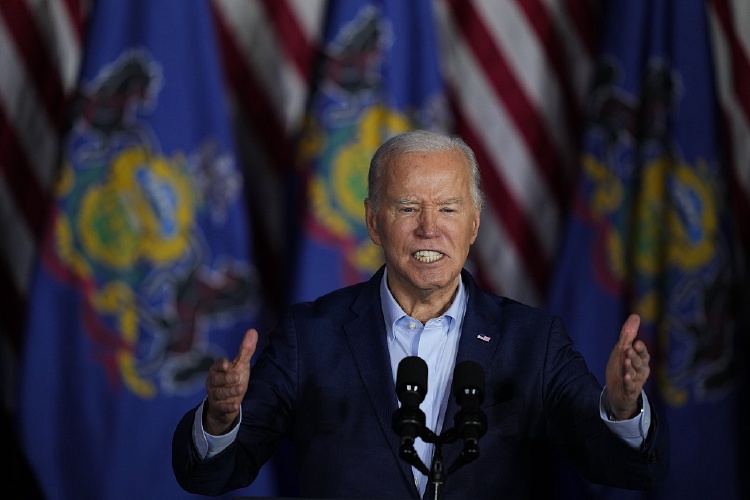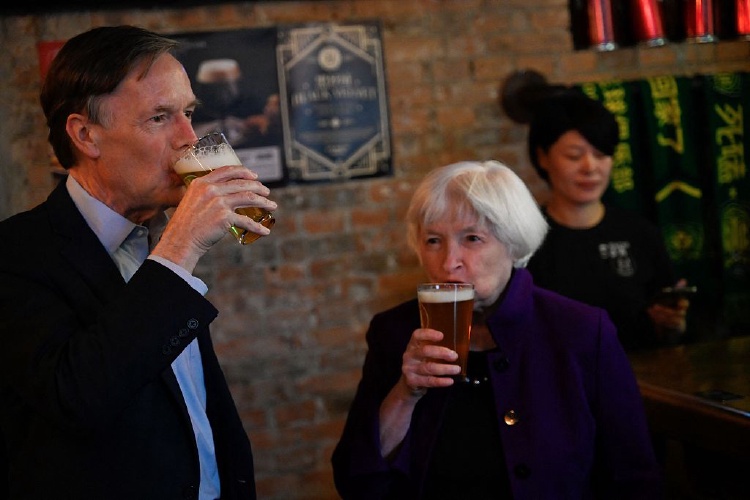Imitate Trump to win votes? Biden will announce that the tariff on aluminum in Huagang will be more than tripled.
According to Reuters, Associated Press and other foreign media reports on April 17th, U.S. President Biden is expected to officially announce that he will triple the current aluminum tariff on Huagang in a speech to steel workers in Pittsburgh, which is known as the "steel capital" later that day.
Pennsylvania, where Pittsburgh is located, is one of the "battleground states" in the American election. This move coincides with the warming of the US election campaign. Many media associations have analyzed that Biden seems to "emulate" Trump’s "old trick" and consolidate blue-collar votes through protectionist policies. However, according to the White House, steel imports from China only account for 0.6% of the total steel demand in the United States.
Earlier this month, Bloomberg reported that China did not seek to produce more steel than long-term demand, and should not be responsible for the weak steel prices in the United States. The Associated Press warned on the 17th that rashly raising tariffs may bring economic risks to the United States, which is already facing the inflation crisis in Qualcomm, and may also affect other downstream industries.

On the 17th, the White House website published a so-called "list of facts", claiming that new "historic actions" will be taken to protect American steel manufacturing and shipbuilding industries from China’s "unfair behavior". The first one is to call on the Office of the United States Trade Representative (USTR) to consider "tripling" the current "Article 301" tariff rate for China steel and aluminum products.
Biden’s proposed tariff increase was originally imposed by former President Trump under Article 301. "Section 301" refers to Section 301 of the US Trade Act of 1974, which authorizes the US Trade Representative to initiate an investigation into "unreasonable or unfair trade practices" of other countries, and may suggest the US President to impose unilateral sanctions after the investigation. The White House said that at present, the average tariff imposed by the United States on some steel and aluminum products is 7.5%. According to a US government official, Biden plans to increase this figure to 25%.
According to "Article 301", four years after the first collection of tariffs, the procedures for reviewing these tariffs must be carried out. The review led by Dai Qi, the current trade representative, should have ended by the end of 2023, but it has not been completed so far and has been urged by some business groups. According to a report by CNN on the 17th, a senior Biden administration official said that it is expected that the review will be completed "soon" and Biden may take actions to "(strengthen) the effectiveness of tariffs" according to the review results.
It is reported that Biden will visit the largest trade union in North America in Pittsburgh, Pennsylvania on the 17th — — United steelworkers union (USW) headquarters and announced the above measures in a speech. Located in the "rust belt", Pennsylvania is the main base of traditional industries such as coal, steel and mechanical and electrical products in the United States, and USW represents nearly one million workers in the steel industry in North America. Neither the Democratic Party nor the Republican Party can ignore this powerful force.
Biden’s high-profile approach is part of his campaign for the November presidential election in Pennsylvania, where he is expected to launch a three-day canvassing campaign from April 16 to 18. Pennsylvania is regarded as one of the six key swing states. In the 2020 general election, Biden narrowly defeated Trump here. Biden himself was born in scranton, northeastern Pennsylvania. The US media said that he visited the state more times than any other state.
"The president understands that we must invest in American manufacturing." When briefing the media, Lael Brainard, director of the White House National Economic Council (NEC), claimed that "overcapacity" in China’s steel industry "poses a serious risk" to the future of the US steel and aluminum industry, and Biden’s appeal would protect the US manufacturing industry from the so-called China subsidies and policies.
In addition to raising tariffs, the White House announced on the 17th that it would further cooperate with Mexico to ensure that enterprises and manufacturers in China and other countries could not evade tariffs by transporting steel or aluminum products to a third country and then exporting them to the US market. In addition, the White House also responded to a petition filed by five major trade unions, including USW, last month, saying that the US Trade Representative is investigating China’s so-called "unfair trade practices" in maritime, logistics and shipbuilding industries.
Although the White House tried to explain to the US media that their tariff increase is different from Trump’s, it is "strategic, balanced and targeted" and more to "protect" the US manufacturing industry, but many US media have mentioned in their reports that this move may bring major economic risks to the United States, and economic problems have dragged down Biden’s political fate.
The US Consumer News and Business Channel (CNBC) said that critics believe that increasing tariffs will only be counterproductive, raising US consumer prices and exacerbating inflation. The Associated Press pointed out that after raising tariffs, the prices of steel and aluminum may rise, which may increase the cost of automobiles, building materials and other major commodities for American consumers. Washington post bluntly said that this measure against the steel industry may cheer Biden’s trade union audience, but it may also increase the cost of other industries that use steel, which employ far more workers.
In the view of the Associated Press, Biden’s turn to trade protectionism policy on the eve of the election is exactly the same as that of his predecessor and rival Trump. CNBC said that Biden has been stepping up his remarks about China’s economic policy, and so has Trump, who once said that he would consider imposing a 60% tariff on all goods imported from China. An external analysis by Oxford Economic Research Institute shows that the implementation of Trump’s proposed tariffs may damage the overall economy of the United States.
The US media has noticed that recently, American officials have been "complaining" about China’s manufacturing overcapacity more and more frequently. Yellen, the finance minister who visited China earlier this month, repeatedly mentioned and hyped the problem of "overcapacity" in China’s traditional manufacturing and new energy industries, claiming that this "distorted the global market".

In this regard, Bloomberg published an article on April 3rd, pointing out that China did not seek to produce steel beyond the long-term demand. Compared with its output, it is not even a particularly large steel exporter, and China should not be responsible for the weak steel prices in the United States. According to the White House in its "list of facts", steel imports from China only account for 0.6% of the total steel demand in the United States.
The article also stated that the tariffs imposed by the United States on China many years ago did not prevent the reduction of jobs in its domestic metal manufacturing industry. With the United States entering the post-industrial and service-oriented development stage, American steel consumption has peaked and is declining. In the past decade, misleading steel protectionism has only increased the cost of other areas of the American economy and reduced its competitiveness.
China Iron and Steel Industry Association and China Nonferrous Metals Industry Association said in a statement earlier that the core goal of China’s iron and steel industry and aluminum industry has always been to meet domestic demand and achieve high-quality development. China’s exports of steel and aluminum products to the United States account for a small proportion. The trade and cooperation between the two countries’ industries are based on the strong complementarity between China and the United States, and are completely based on the principle of fair marketization, which not only does not harm the United States, but also benefits downstream customers and promotes the development of related fields in the United States.
According to the statement, China’s steel and aluminum industries began to eliminate backward production capacity in 2010, and implemented supply-side structural reforms in 2016, greatly reducing the production capacity of steel and electrolytic aluminum. Up to now, the steel and aluminum industry in China has been strictly controlling the new production capacity, and at the same time, it has set up a ceiling for production capacity. The reform has achieved remarkable results and effectively promoted the healthy and sustainable development of the steel and aluminum industry in the world.
As for the issue of the US levying tariffs on China, China has also responded more than once. Mao Ning, the Foreign Ministry of China, once pointed out that the essence of Sino-US economic and trade cooperation is mutual benefit and win-win. There is no winner in trade wars and tariff war, and artificial restrictions or protectionism will only interfere with normal trade exchanges and the stability of the production and supply chain, which is not in the interest of either party. The United States should earnestly respect the principles of market economy and international trade rules and create a good environment for Sino-US economic and trade cooperation, not the other way around.
Original title: Imitating Trump to win votes? Biden will announce that the tariff on aluminum in Huagang will be more than tripled.
Editor: Chen Yanqi Editor: Wu Zhonglan Audit: Feng Fei